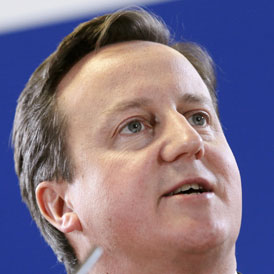We could take legal action over treaty, Cameron warns
Prime Minister David Cameron tells MPs that Britain will take legal action if the new treaty drawn up by eurozone nations threatens the country’s national interests.
Mr Cameron was reporting back to MPs after Monday’s European summit in Brussels, where he abandoned his previous oppositon to allowing EU institutions, including the European Court of Justice (ECJ), to enforce a new fiscal pact in the eurozone.
He ruled this out at a summit in December, and Conservative MPs are concerned that the institutions, which serve the entire EU including Britain, could be used against UK interests.
But Mr Cameron told the Commons: “I made clear we will watch this closely and if necessary we will take action, including legal action, if our national interests are threatened by misuse of the institutions.”
Eurozone leaders believe the fiscal pact will help to stabilise the currency bloc while it tries to resolve its debt crisis. Members of the single currency will be expected to maintain budgetary discipline – and avoid spiralling deficits – or risk being fined by the ECJ.
Greece and Portugal under pressure over debts
The prime minister was taunted by Labour leader Ed Miliband, who said Mr Cameron had used Britain’s veto at the December summit to stop the institutions from being used by the eurozone, but this had now changed. “With this prime minister, a veto is not for life, it’s just for Christmas,” he told MPs.
With this prime minister, a veto is not for life, it’s just for Christmas. Labour leader Ed Miliband
Mr Miliband said Mr Cameron’s veto had been “exposed” as a “phantom”, adding: “It talks like a European treaty, it walks like a European treaty, it is a European treaty, and for Britain he has secured absolutely no protections at all.”
Ed Miliband had his best outing yet on the EU Council statement. The PM looked on shaky ground, a bit like one of David Attenborough’s seals on a small floating iceberg. Read more Political Editor Gary Gibbon

Mr Cameron said that when he turned up at the December summit, he had intended to sign a treaty, but had not done so because he was not given the assurances he had requested. “I did not get those safeguards, so I vetoed that treaty,” he said.
The prime minister said eurozone countries were now making arrangements for a fiscal pact outside the EU treaties, adding: “The new inter-governmental agreement is absolutely explicit and clear that it cannot encroach on the competencies of the European Union and they must not take measures that in any way undermine the EU single market.
If necessary we will take action, including legal action, if our national interests are threatened. Prime Minister David Cameron
“This is a treaty outside the EU. We are not signing it, we are not ratifying it, we are not part of it, and it places no obligations on the United Kingdom. It doesn’t have the force of EU law for us, nor does it have the force of EU law for the EU institutions, nor does it have the force of EU law for the countries who sign it.”
Before his Commons statement, Mr Cameron’s official spokesman said there had been “agreement round the Cabinet table” when the prime minister briefed his ministers on the outcome of the summit.
Conservative concerns
Work and Pensions Secretary Iain Duncan Smith, a Eurosceptic, raised legal issues over the use of EU institutions, he said, but “recognised” that they had been “registered in the treaty”.
Former Conservative Europe minister David Davis told BBC Radio 4’s World At One programme that his party understood Mr Cameron had to keep Europhile Liberal Democrats on board.
But he said Britain must also “reserve the right to veto something late on, whether it is the use of the court or whether it is some element of the treaty”.
Coalition
The leader of Britain’s Tory MEPs, Martin Callanan, said government policy on the fiscal pact had changed, partly because of a need to mollify Nick Clegg, the pro-European deputy prime minister.
He said: “I blame a combination of appeasing Nick Clegg, who is desperate to sign anything the EU puts in front of him, and the practical reality that this pact is actually quite hard to prevent.”
Tory MP Philip Davies said: “We don’t want David Cameron to go down the road of waving the white flag. This will define whether he’s seen as a Thatcher or a Major. If he caves in I’m afraid the comparison will be with John Major.”
-
Latest news
-
As India goes to the polls in the world’s largest election – what do British-Indians think?6m

-
Tees Valley: Meet the candidates in one of the biggest contests coming up in May’s local elections4m

-
Keir Starmer says public sector reform will be a struggle7m

-
Nicola Sturgeon’s husband Peter Murrell charged with embezzlement of funds from SNP1m

-
Ukraine might finally get $60billion in American weapons and assistance to defend against Russia3m

-




